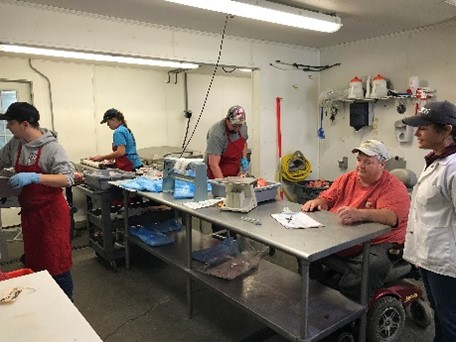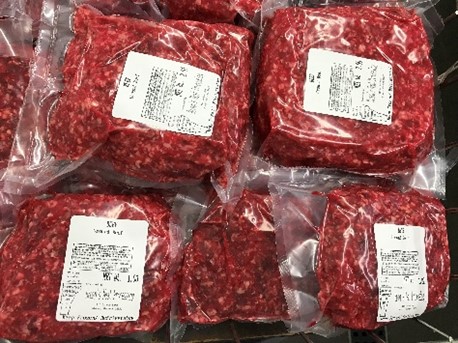By Joni Bales, VT Agency of Agriculture, Food & Markets
Since 1967, the Vermont State Meat Inspection program has been providing daily inspection services in each Vermont meat processing and slaughter establishment. These inspection services occur on every day these establishments produce meat products bearing the State of Vermont mark of inspection. There are currently seven commercial state slaughter establishments, and five commercial state meat processors. Additionally, Food Safety Specialists provide periodic sanitation inspection at 31 custom slaughter and processors (meat produced as custom are for the personal consumption of the owner and marked “Not for Sale” to the public). Periodic sanitation reviews are also done at the more than 1800 retail meat establishments. Retail vendors include all locations that sell any form of meat or poultry, including the obvious grocery stores, farm stands, even gas stations and hardware stores.
Vermont’s unique agricultural economy makes the state meat inspection program essential. We are a state of small and local growers and producers and need a structure to accommodate this. Increasingly, the farming and processing of our nation’s meat and poultry is being concentrated in just a few companies. This is not the case in Vermont.
The ability of small slaughterhouses and processors to be inspected locally enables farmers that have just a few head of cattle or pigs, or a few hundred chickens, to get those products into the marketplace and enhance the income of their farm. For meat and poultry to be sold in this state, it must be processed and slaughtered under inspection. (There is an exemption for small poultry producers). It is a uniquely Vermont experience for a customer to be able to drive through the countryside and see functioning farms, meet the farmers, see the animals, or produce right there in the field or barn, and then be able to buy the meat and poultry at the farm stand or a nearby grocery, after it has been processed, packaged, and labelled under inspection. To put it in perspective, when it is said that Vermont producers are small by comparison, Vermont slaughterhouses are processing a few dozen livestock or a few hundred poultry per day, usually 1 to a few days a week. This is in comparison to few thousand livestock or a few hundred thousand poultry in the very large establishments of the south and mid-west!
The state inspection program can best be described as “interlaced” with the Federal Meat Inspection Program which is operated by the Food Safety Inspection Service (FSIS), part of USDA. There is a formal cooperative agreement between the state inspection program and the federal inspection program. All Food Safety Specialists that work in the state program go through the rigorous six - month USDA training process alongside their federal counterparts. They attend a mandatory one-month training seminar on Inspection Methods conducted by the USDA, as well as classes specifically detailing inspection procedures at livestock and poultry slaughter establishments. The methods and criteria for inspecting state and federal establishments are almost “exactly” the same. This is no coincidence, as it is required under regulations dictated by the Federal Meat Inspection Act and the Poultry Products Inspection Act that give inspectors their authority. All state meat inspection programs must ensure that state meat and poultry processors follow regulations that are “At Least Equal To” the rules outlined for Federal establishments.
The USDA FSIS conducts two types of audits on state programs to verify their “At Least Equal To” status.
- Annually, the USDA audits all records, inspections, reports, test results, etc.
- And every three years, the USDA conducts an actual on-site review of all the state establishments and state offices. They must accept Vermont’s system to retain the “equal to” status. The USDA provides a 50/50 match for funding of the Vermont Meat Inspection program to provide these services. If Vermont did not have its own meat inspection program, all meat and poultry slaughterers and processors would have to be inspected by the USDA FSIS.
In addition to its state-inspected establishments, Vermont also has 12 USDA inspected slaughter establishments, and 15 meat/poultry processors. Some of these establishments have a full-time inspector employed by the USDA. This is especially true at slaughterhouses that operate year-round.
State and Federal slaughterhouses must have an inspector present the entire day; from the moment the first animal is presented for inspection until the last carcass is stowed in the cooler. Processors must have an inspector present for a portion of each day that they are processing. These establishments do everything from smoking bacon and hams, making beef jerky, making frozen pizzas, to cutting up whole sides of meat into retail cuts and packaging them. Another part of the cooperative relationship between the state’s meat inspection program and the federal program is that the state inspectors are frequently utilized to inspect at federal establishments where there is no full-time federal inspector, or to cover when that inspector is on leave. This further illustrates the need to have an “At Least Equal To” status; otherwise, Vermont Inspectors would not be able to fulfill this vital role.
The role of the Vermont Food Safety Specialist is multi-faceted, but they are a resource to ensure farmers and meat processors can legally get their product into commerce, and ensure the consumer is protected. The mission of the program is: “To protect the health and welfare of consumers and the public by assuring meat and poultry products produced are wholesome, unadulterated, and properly marked, labeled, and packaged.”
Sources: “Comprehensive Review and Determination Report Fiscal Year 2021, Vermont,” Office of Investigation, Enforcement and Audit, FSIS USDA April 2022, (https://www.fsis.usda.gov/sites/default/files/media_file/2021-02/state-review-vermont.pdf) pg. 5
“State Inspection Programs,” (https://www.fsis.usda.gov/inspection/state-inspection-programs#Vermont) June 23, 2022
“Vermont Meat and Poultry Inspection,” (https://agriculture.vermont.gov/food-safety/vermont-meat-poultry-inspection) June 23, 2022

Vermont State Meat Inspection Program Section Chief Julie Boisvert discusses production records with Phil Brown, Owner of Brown’s Meat Processing in Glover, Vermont while his employees package ground beef.

Brown’s Ground Beef bearing Vermont’s official mark of inspection.
